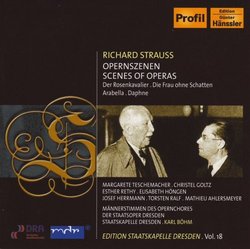| All Artists: Josef Herrmann, Mathieu Ahlersmeyer, Richard [1] Strauss, Karl Böhm, Dresden Staatskapelle, Christel Goltz, Esther Rethy, Margarete Teschemacher, Torsten Ralf Title: Strauss: Scenes of Operas Members Wishing: 0 Total Copies: 0 Label: Profil - G Haenssler Original Release Date: 1/1/2007 Re-Release Date: 8/28/2007 Genre: Classical Style: Opera & Classical Vocal Number of Discs: 1 SwapaCD Credits: 1 UPC: 881488703955 |
Search - Josef Herrmann, Mathieu Ahlersmeyer, Richard [1] Strauss :: Strauss: Scenes of Operas
 | Josef Herrmann, Mathieu Ahlersmeyer, Richard [1] Strauss Strauss: Scenes of Operas Genre: Classical
|
Larger Image |
CD Details |
CD ReviewsAn Historical Document of Strauss Opera Performances J Scott Morrison | Middlebury VT, USA | 09/19/2007 (4 out of 5 stars) "The music on this CD is taken from the vaults of the Staatskapelle Dresden and its sister institution, Dresden's Semper Opera, part of an ongoing series of releases of historical material from that greatest of all Richard Strauss orchestras. You will recall that many of Strauss's operas were premiered in Dresden, a city he called 'the Eldorado of premieres', and that there is a long tradition of Strauss performances there under such great maestros as Richard Strauss himself, Rudolf Kempe and, as on this disc, Karl Böhm. The selections included here, recorded in the period 1938-1942, are from radio broadcasts of selections from four of Strauss's 'Dresden' operas: Der Rosenkavalier, Die Frau ohne Schatten, Arabella and Daphne. The singers include some of the luminaries of German opera of the time, such artists as Margarete Teschemacher, Christel Goltz, Elisabeth Höngen, Josef Hermann, Torsten Ralf and Mathieu Ahlersmeyer.
First a word about the recorded sound. It is, of course, in mono. It has been restored and digitally remastered and is quite frankly some of the best sound from recordings of the period that I've ever encountered. Had I not known, I would have guessed that the recordings came from the mid-1950s, just before the introduction of stereo. As for the performances, they are generally quite wonderful. As Amazon has not as of the date of this review listed the precise contents of the disc I shall do so: Der Rosekavalier, 1 -'Mit ihren Augen voll Tränen', the duet from Act II, with Esther Rethy (Sophie) and Elisabeth Höngen (Octavian), rec. Dec. 1940 2 - The waltz sequence from Act III, rec. Dec. 1938 3 - 'Ist ein Traum, kann nicht wirklich sein', Octavian and Sophie's duet at the end of Act III, rec. Dec. 1940 Die Frau ohne Schatten 1- 'Sie haben es mir gesagt', the Act I finale with baritone Joseph Hermann as Barak, rec. June 1942 2 - 'Falke, du wiedergefundener', with tenor Torsten Ralf as the Emperor, rec. June 1942 Arabella 1 - 'Er ist Richtige nicht', Act I scene and duet, with Margarete Teschemacher (Arabella) and Christel Goltz (Zdenka), rec. June 1942 2 - 'Der Richtige wenn's einen gibt für mich... Und du wirst mein Gebieter sein', scene and duet from Act II, Teschemacher and Mathieu Ahlersmeyer (Mandryka), rec. June 1942 3 - 'Sie gibt mir keinen Blick... Das war sehr gut, Mandryka', scene and duet from Act III, Teschemacher and Ahlersmeyer, rec. June 1942 Daphne 1 - 'Götter, Brüder im hohen Olympos', Apollo's aria, Torsten Ralf, rec. Feb 1939 2 - 'O wie gern blieb ich bei dir', Daphne's aria, rec. Feb. 1939 3 - Daphne's Tranformation: 'Wind, spiele mit mir', Teschmacher, rec. Dec. 1938 A few words about the performances: I've always loved the voice of tenor Torsten Ralf (in spite of his dodgy German pronunciation) and he is at his best in the 'Daphne' aria, with ringing heroic tone, and in the 'Frau ohne Schatten' scene. The duets from 'Rosenkavalier', with Höngen and Rethy, are marvelous, too. I'd never noted the voice of Joseph Ahlersmeyer before but he is spectacular as Mandryka. As for the performances of the Staatskapelle I have to say that they are Strauss orchestra of my dreams, due in part no doubt, to Böhm's sensitive direction. Finally, one must note that of course these recordings all come from Nazi Germany during World War II and thus there is a certain inevitable reaction to that, something along the lines of 'How could such glorious music be coming out of such a horrific regime?', but I hope that now, after close to seventy years, with these recordings coming out of the vaults, perhaps we can simply listen to them without judging the artists involved except on artistic grounds. I recognize there are those who cannot do that; still this is glorious music in glorious performances. Scott Morrison" |

 Track Listings (11) - Disc #1
Track Listings (11) - Disc #1